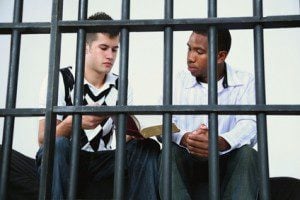Nicholas C. DiDonato
 Civil authorities have long wondered what leads some prisoners to reform themselves and go on the path towards good citizenship, while others become lifetime prisoners through repeated offenses. While any answer to this question involves many variables and dimensions, religion’s role continues to be a matter of great dispute. Seeking a balanced analysis, criminologist Kent Kerley (University of Alabama at Birmingham) and colleagues argue that after controlling for demographics, criminal history, and self-control, frequent attendance at religious services predicts reduced prison deviance.
Civil authorities have long wondered what leads some prisoners to reform themselves and go on the path towards good citizenship, while others become lifetime prisoners through repeated offenses. While any answer to this question involves many variables and dimensions, religion’s role continues to be a matter of great dispute. Seeking a balanced analysis, criminologist Kent Kerley (University of Alabama at Birmingham) and colleagues argue that after controlling for demographics, criminal history, and self-control, frequent attendance at religious services predicts reduced prison deviance.
Their finding contradict two opposing sides of this dispute. One side argues that religion has nothing to do whatsoever with prison deviance and that any correlation can be readily explained by other factors (such as self-control). The other side counters that not only does religion correlate with such reduced prison deviance, but it does so in several measures (specifically, prayer frequency, frequency of watching religious television, and frequency of attendance at religious services).
In order to investigate the relationship between religion and prison deviance, the researchers asked inmates across four work-release facilities to complete a series of surveys. Of the 480 possible participants, 208 agreed (an acceptable rate in prison studies). While the researchers kept the data they received confidential, they supervised the prisoners in taking their surveys in order to increase the validity of the results (because of the possibility of low literacy or poor reading comprehension).
The surveys asked about prison deviance, specifically, “While you were in prison, how often did you: (1) destroy prison property, (2) get in physical fights with other prisoners, (3) carry, possess, or have a weapon stored nearby, and (4) spend time in the disciplinary unit?” They also inquired into how frequently the participants prayed by themselves, watched a religious television program, or attended a religious service or class. As for self-control, the researchers used a standard survey that included items about impulsivity, risk-seeking behavior, physical activity, self-centeredness, volatile temper, and simple tasks (that is, whether someone enjoys simple tasks and avoids complex ones). Finally, the researchers accounted for criminal history (by asking how young the participant was when first arrested, and how many times the participant has been arrested and imprisoned) and demographics (age, race, ethnicity, and education, all of which predict prison deviance).
After controlling for self-control, criminal history, and demographic information, the researchers found that attending a religious service or class, but not praying privately or watching religious shows, predicts reduced prison deviance. As expected, self-control, criminal history, and demographics all played a role in predicting decreased prison deviance, but religious attendance made its own unique, statistically significant impact.
Importantly, self-control itself predicts all three of the religious variables (praying privately, watching religious broadcasts, and attending religious classes or groups). Although in this particular study self-control did not completely explain away the effect of religious attendance (as it did the other two), it does suggest that those with self-control are more likely to engage in the three religious behaviors measured. As such, the researchers concluded that “inmates who more frequently participate in religious classes/groups are less likely to be involved in deviance. Thus, both religiosity and self-control appear to be important constructs in explaining prison deviance in our sample.”
Of course, no single study can decisively answer such a complex question as the relationship between religion and prison deviance. Yet, if attending religious services does lead to reduced deviance and ultimately to good citizenship, then perhaps there is a connection between loving God and neighbor.
For more, see “Examining the Relationship Between Religiosity and Self-Control as Predictors of Prison Deviance” in the International Journal of Offender Therapy and Comparative Criminology.











